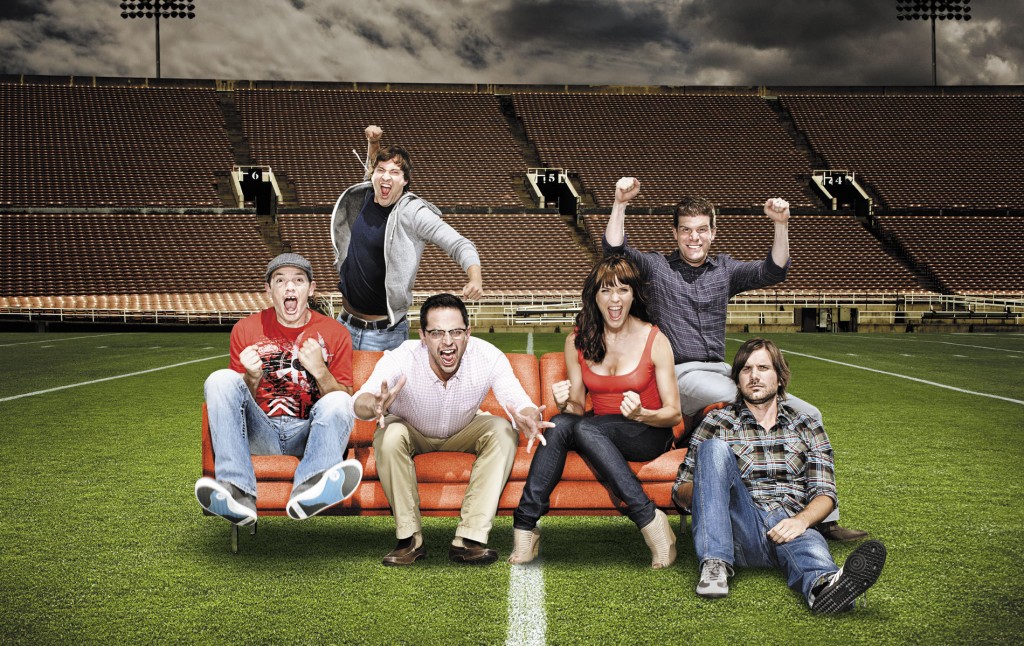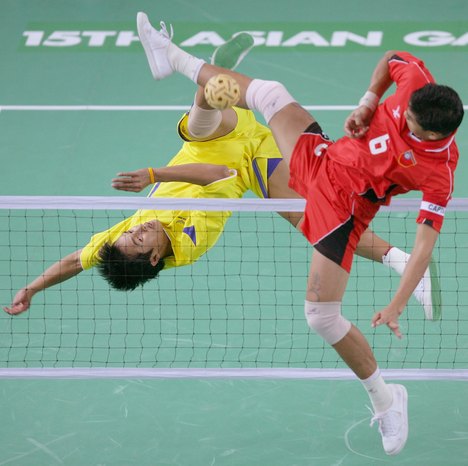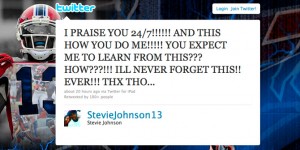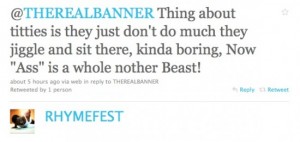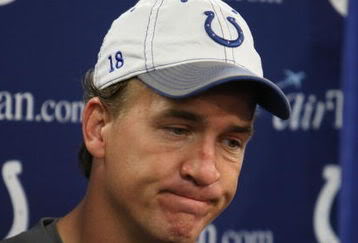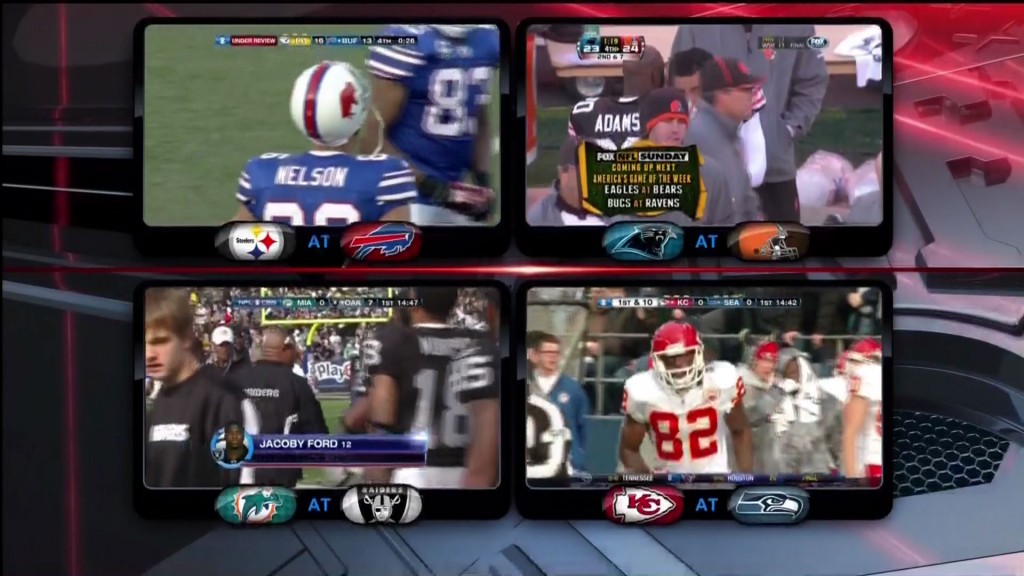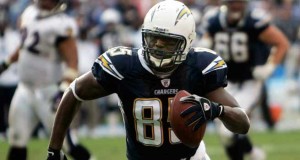James writes about fantasy football leagues, as well as The League.
I had a dream. No, a fantasy. A fantasy about the freedom to live on my schedule and not to be restricted by the tyrannical force of time when it comes to consuming television. Luckily, online streaming, DVDs, downloads, PVRs and timeshifting have all changed the way we watch television. Specifically it changes when we watch television from whenever our show’s on to whenever the fuck we want, and my fantasy is a reality. To think that there was a time our time when we scheduled our social lives around when our favourite shows were on seems a little sad….and anti-social. And while there are still times I’m sure some of us still head home early from bad parties with that excuse, we have to follow the airing schedule less and less. As a result, we don’t experience a lot of our programming at the same time and this decline in simultaneous consumption this has contributed to audience fragmentation. Besides a greater control of the time we watch, another contributing factor is the sheer number of choices we have of what to watch. Most people have access to hundreds of channels on their television now, and this does not include all the time spent on web series, YouTube videos, the million other things to watch on the Internet, or the low cost to create and distribute feature films, or Netflix. People have literally millions of choices as to what to watch and an extreme level of control over when to watch it. The audience isn’t just fragmented, it’s blown apart.
While this is having a pretty big impact on lots of forms of visual entertainment, one form appears less susceptible to this fragmentation: professional sports. Relatively speaking, niche sports aren’t as big of a deal as the wide variety of television shows to watch. Creating even a relatively cheap television show is less expensive than the risk and overhead involved in creating a spectator sport to air. While you may have some weird friend who keeps up with sepak tekraw, most people want to see sports being played by the most athletic, well-trained people in the world, and these people most often flock to lucrative, established professional sports. Other than variety of choices, the other contributing factor to fragmentation, control over the timing of consumption, is not as easily applied to sports.
Unlike other television shows, sports have a large degree of timeliness to them. If you had two things to watch, a pre-recorded drama or a live sporting event, my guess is that you’d record the drama and watch the sport because of its timely nature. While pro sports leagues are essentially gigantic reality shows that air live, that live element is an integral part of their nature. Technology like PVRs allow us to record games, but most new media is forcing us to watch sports more immediately. Unless you plan to suspend your use of Twitter, Facebook and news websites, you are likely to have results spoiled for you quickly by friends, celebrities and any news outlets you follow. And unlike other TV shows, the ‘cast,’ in this case, the players, just experienced what you witnessed, (unlike a TV season that was shot 6 months ago and being released bit by bit while the actors have moved on to something else) and are reacting to the aftermath in real time on social media. And in case you haven’t discovered this yet, athletes on Twitter might be the best thing since rappers on Twitter.
And unlike other television shows, we treat what happened in tonight’s game like news. Sure, a few niche entertainment shows will discuss American Idol cuts or Grey’s Anatomy plot twists shortly after they happen, but with sports, all major news outlets give sports their time, even if their network didn’t carry the game. On top of this, the low cost of traditional media has increased the ubiquity of TV screens everywhere from subway stops to inside washrooms, and if they aren’t showing games, they often have a news crawl that spends a fifth of its time covering sports.
For these reasons of quality and timeliness, fragmentation shouldn’t have as much effect on sports but recent technologies and, more importantly, trends have caused the consumption and presentation of the product to alter greatly. Specifically, I am talking about fantasy football. First I want to establish just how big this activity is to the NFL. It is estimated that 19 million play in the US alone and the NFL itself considers fantasy to be its number 1 marketing tool. According to its research, participants in fantasy football are more likely to purchase merchandise, attend games and spend money in the stadium, and 55% of fans say they watch more games after they started playing in a fantasy league. It should be obvious why the NFL wants this to continue and has taken steps towards that goal. Last year, the league issued an order that all teams display fantasy stats from other games on their video boards during games. I pointed out earlier how sports, including football, are less likely to lose their audience to fragmentation to other forms of television, but they seem to be inviting the fragmentation of the audience’s attention within their own sport. It is part of the very nature of fantasy football. According to future Football (and Forehead) Hall of Famer Peyton Manning, this is how an average interaction with a fan goes since the explosion in popularity of fantasy football:
Fan: “Hey, great game last week.”
Peyton: “Yeah, but we lost.”
Fan: “But you threw five touchdowns, and that’s all I need from you.”
That isn’t a joke. He said this in an interview and you don’t need to hear his voice to tell he’s not pleased about it.
Many players have commented they feel it has ruined the game, as more people are now concerned about their own fantasy team when they used care about the NFL team. And since their team has players from so many teams, they care about so many games. Even if they do focus on one game, which they don’t, the final score can be entirely irrelevant as wins and losses in the NFL have no effect on your record in your fantasy league. While the audience hasn’t been fragmented away from football, their rooting patterns within it have altered. People no longer cheer for teams the way they used to but for individual performances. These two can often conflict with each other and when the quarterback someone owns in fantasy, and is therefore cheering for, turns the ball over, that fan may actively root against that quarterback’s team just so the opposing team scores quickly and he gets the ball back sooner. It seems counter-intuitive to cheer against the team of the player you were just cheering for but fantasy football breeds such behaviour. Things get more complicated when the same fantasy owner has a player on the other team, or that owner’s opponent has a player on the same team. This leads into a very convoluted list of acceptable and unacceptable plays that they cheer for very carefully. Imagine such divided feelings but multiplied by 16 games each week, coupled with concerns over teams near you in the rankings that you need to do poorly etc. and you start to get the scope of the fragmented enthusiasm of fantasy football.
Fantasy football, or something very similar in premise, has been around since 1962 but it has only started to go mainstream in the last 10 to 15 years and this is due to technology making it a lot easier and fun to participate in. Some of the earliest leagues involved mailing your lineup to your league commissioner and opponents each week and receiving results in the same way. There was extremely limited communication between owners, whereas now, insulting your opponents accounts for a majority of activity in any league I’ve ever seen. Websites make the fantasy leagues so accessible and satellite dishes, cable packages, Internet streams and channels like NFL Red Zone make them possible to follow visually in real time. If you want to get an idea of how fragmented the football watching experience has become, watch NFL Red Zone for five minutes. It is a channel that prides itself on showing you every score from every game, of which there are sometimes eight happening simultaneously. It is a nonstop avalanche of highlights, updates, stats and splitscreens that is awesome, dizzying, entertaining, confusing, useful and overwhelming all at once. You never get the idea of the feeling of any individual game or how the momentum is swinging because you’re witnessing so much scoring and consuming so much fantasy data that it kind of wants to make you puke. And do you want to know a secret? I kind of love NFL Red Zone. I do, despite its nauseating pace and the fact that it sort of sums up many of the legitimate criticism of my generation: that we only want to be entertained and can’t appreciate the work that goes into it, that we need non-stop stimulation and to do, see, experience everything all at once, that we only care about individuals, that we only care about ourselves…but it’s just so fucking cool when they have to go to quadbox because we’re in the midst of so much awesomeness.
This brings me to The League, FX’s semi-improvised comedy show based around friends competing in a fantasy football league, and a story that I hope doesn’t come off as too condescending. A group of friends of mine who were not football fans became such fans of The League that they chose to start their own fantasy league so they could act out what they found so funny in the show. I was not a member of their league but I did watch a few games with them and found it interesting how much fun they had pretending to coach made-up teams for a sport they didn’t really understand at the time. Since it has been around that long, we know fantasy football was obviously possible 50 years ago, but it was digital technology that made it less tedious to play and the Internet and social media that made it more communal and fun to be a part of. What I was witnessing was the convenient technologies’ resulting boom in popularity having a major effect on how my friends were introduced to a sport. Fantasy football had become big enough to have a TV show built around it and, for at least these friends of mine in this league, completely altered the traditional way we identify with athletes.
For example, because they had been exposed to him more through The League than The National Football League, Antonio Gates was the guy from season one, episode four. In a secondary sense, they thought of him as someone who plays on someone else’s team in their league, or as a pawn for them to get points. And thirdly, they eventually saw him as a member of the San Diego Chargers who might help that NFL team win a Super Bowl, which is the way most people would have looked at football players just ten years earlier. Not only was their view on him fragmented, the role he was traditionally identified through was the least prominent. The fact of the matter is, with all the fragmentation I’ve discussed, their fantasy league seems to have brought them closer together, giving them another excuse to get together, something else to talk about and another reason to scream obscenities at one another, and it’s because of fantasy football and because of The League.
The League airs at 8:30 on Thursday nights, putting it up against Thursday Night Football. While you don’t need to be a football fan to enjoy the show, as my aforementioned friends proved, it certainly does help, and The League is the show most involved with fantasy football outside of analysis shows on sports channels. But I’m not a television executive, even though sometimes I want to be. And I think that’s how things work for a lot of people now and not just as far as fantasy is concerned. They like the idea of being a coach and in a far less competitive and time-consuming way, they get to be. And it’s not just fantasy football where we do this. It is a lot easier to do other jobs, even fantasy versions of them, than it ever has been before. Sure it is not a paid job or quite up to industry-level standards, but people are able to dabble in several different professions, for a small amount of time or for many hours every year. Only two decades ago it would be odd to expect any time acting as an amateur DJ, football coach, graphic designer, movie reviewer, video editor, game developer, etc. in any capacity, and now it’s really not very difficult to do all these activities in a single week. While many people want the money and respect that come with having these jobs for real, judging by the tens of million people who play fantasy football, some people simply enjoy doing the job, or some comically simplified version of it. It’s the best of both worlds where you get the job but none of the year-round stress or angry bosses. A casual fan who didn’t grow up living and breathing football can still live every young fan’s dream: to get the chance to choose between world-class quarterbacks, and then spend the off-season thinking on how to make the best puns about Michael Vick killing dogs or Brett Favre taking dick pics while wearing Crocs.

